- Home
- Emile Gaboriau
Within an Inch of His Life Page 9
Within an Inch of His Life Read online
Page 9
IX.
M. de Boiscoran looked around him like a man who has suddenly beenseized with vertigo, pale, as if all his blood had rushed to his heart.
He saw nothing but mournful, dismayed faces.
Anthony, his old trusted servant, was leaning against the doorpost, asif he feared to fall. The clerk was mending his pen in the air, overcomewith amazement. M. Daubigeon hung his head.
"This is horrible!" he murmured: "this is horrible!"
He fell heavily into a chair, pressing his hands on his heart, as if tokeep down the sobs that threatened to rise. M. Galpin alone seemed toremain perfectly cool. The law, which he imagined he was representing inall its dignity, knows nothing of emotions. His thin lips even trembleda little, as if a slight smile was about to burst forth: it was the coldsmile of the ambitious man, who thinks he has played his little partwell.
Did not every thing tend to prove that Jacques de Boiscoran was theguilty man, and that, in the alternative between a friend, and anopportunity of gaining high distinction, he had chosen well? After thesilence of a minute, which seemed to be a century, he went and stood,with arms crossed on his chest, before the accused, and asked him,--
"Do you confess?"
M. de Boiscoran sprang up as if moved by a spring, and said,--
"What? What do you want me to confess?"
"That you have committed the crime at Valpinson."
The young man pressed his hands convulsively on his brow, and criedout,--
"But I am mad! I should have committed such a fearful, cowardly crime?Is that possible? Is that likely? I might confess, and you would notbelieve me. No! I am sure you would not believe my own words."
He would have moved the marble on his mantelpiece sooner than M. Galpin.The latter replied in icy tones,--
"I am not part of the question here. Why will you refer to relationswhich must be forgotten? It is no longer the friend who speaks to you,not even the man, but simply the magistrate. You were seen"--
"Who is the wretch?"
"Cocoleu!"
M. de Boiscoran seemed to be overwhelmed. He stammered,--
"Cocoleu? That poor epileptic idiot whom the Countess Claudieuse haspicked up?"
"The same."
"And upon the strength of the senseless words of a poor imbecile I amcharged with incendiarism, with murder?"
Never had the magistrate made such efforts to assume an air of impassivedignity and icy solemnity, as when he replied,--
"For an hour, at least, poor Cocoleu has been in the full enjoyment ofhis faculties. The ways of Providence are inscrutable."
"But sir"--
"And what does Cocoleu depose? He says he saw you kindle the fire withyour own hands, then conceal yourself behind a pile of wood, and firetwice at Count Claudieuse."
"And all that appears quite natural to you?"
"No! At first it shocked me as it shocked everybody. You seem to befar above all suspicion. But a moment afterwards they pick up thecartridge-case, which can only have belonged to you. Then, upon myarrival here, I surprise you in bed, and find the water in which youhave washed your hands black with coal, and little pieces of charredpaper swimming on top of it."
"Yes," said M. de Boiscoran in an undertone: "it is fate."
"And that is not all," continued the magistrate, raising his voice, "Iexamine you, and you admit having been out from eight o'clock till aftermidnight. I ask what you have been doing, and you refuse to tell me. Iinsist, and you tell a falsehood. In order to overwhelm you, I am forcedto quote the evidence of young Ribot, of Gaudry, and Mrs. Courtois,who have seen you at the very places where you deny having been. Thatcircumstance alone condemns you. Why should you not be willing to tellme what you have been doing during those four hours? You claim to beinnocent. Help me, then, to establish your innocence. Speak, tell mewhat you were doing between eight and midnight."
M. de Boiscoran had no time to answer.
For some time already, half-suppressed cries, and the sound of a largecrowd, had come up from the courtyard. A gendarme came in quite excited;and, turning to the magistrate and the commonwealth attorney, he said,--
"Gentlemen, there are several hundred peasants, men and women, in theyard, who clamor for M. de Boiscoran. They threaten to drag him down tothe river. Some of the men are armed with pitchforks; but the women arethe maddest. My comrade and I have done our best to keep them quiet."
And just then, as if to confirm what he said, the cries came nearer,growing louder and louder; and one could distinctly hear,--
"Drown Boiscoran! Let us drown the incendiary!"
The attorney rose, and told the gendarme,--
"Go down and tell these people that the authorities are this momentexamining the accused; that they interrupt us; and that, if they keepon, they will have to do with me."
The gendarme obeyed his orders. M. de Boiscoran had turned deadly pale.He said to himself,--
"These unfortunate people believe my guilt!"
"Yes," said M. Galpin, who had overheard the words; "and you wouldcomprehend their rage, for which there is good reason, if you knew allthat has happened."
"What else?"
"Two Sauveterre firemen, one the father of five children, have perishedin the flames. Two other men, a farmer from Brechy, and a gendarme whotried to rescue them, have been so seriously burned that their lives arein danger."
M. de Boiscoran said nothing.
"And it is you," continued the magistrate, "who is charged with allthese calamities. You see how important it is for you to exculpateyourself."
"Ah! how can I?"
"If you are innocent, nothing is easier. Tell us how you employedyourself last night."
"I have told you all I can say."
The magistrate seemed to reflect for a full minute; then he said,--
"Take care, M. de Boiscoran: I shall have to have you arrested."
"Do so."
"I shall be obliged to order your arrest at once, and to send you tojail in Sauveterre."
"Very well."
"Then you confess?"
"I confess that I am the victim of an unheard-of combination ofcircumstances; I confess that you are right, and that certain fatalitiescan only be explained by the belief in Providence: but I swear by allthat is holy in the world, I am innocent."
"Prove it."
"Ah! would I not do it if I could?"
"Be good enough, then, to dress, sir, and to follow the gendarmes."
Without a word, M. de Boiscoran went into his dressing-room, followedby his servant, who carried him his clothes. M. Galpin was so busydictating to the clerk the latter part of the examination, that heseemed to forget his prisoner. Old Anthony availed himself of thisopportunity.
"Sir," he whispered into his master's ear while helping him to put onhis clothes.
"What?"
"Hush! Don't speak so loud! The other window is open. It is only abouttwenty feet to the ground: the ground is soft. Close by is one of thecellar openings; and in there, you know, there is the old hiding-place.It is only five miles to the coast, and I will have a good horse readyfor you to-night, at the park-gate."
A bitter smile rose on M. de Boiscoran's lips, as he said,--
"And you too, my old friend: you think I am guilty?"
"I conjure you," said Anthony, "I answer for any thing. It is barelytwenty feet. In your mother's name"--
But, instead of answering him, M. de Boiscoran turned round, and calledM. Galpin. When he had come in, he said to him, "Look at that window,sir! I have money, fast horses; and the sea is only five miles off. Aguilty man would have escaped. I stay here; for I am innocent."
In one point, at least, M. de Boiscoran had been right. Nothing wouldhave been easier for him than to escape, to get into the garden, and toreach the hiding-place which his servant had suggested to him. But afterthat? He had, to be sure, with old Anthony's assistance, some chance ofescaping altogether. But, after all, he might have been found out in hishiding-place, or he migh
t have been overtaken in his ride to the coast.Even if he had succeeded, what would have become of him? His flightwould necessarily have been looked upon as a confession of his guilt.
Under such circumstances, to resist the temptation to escape, and tomake this resistance well known, was in fact not so much an evidenceof innocence as a proof of great cleverness. M. Galpin, at all events,looked upon it in that light; for he judged others by himself. Carefullyand cunningly calculating every step he took in life, he did not believein sudden inspirations. He said, therefore, with an ironical smile,which was to show that he was not so easily taken in,--
"Very well, sir. This circumstance shall be mentioned, as well as theothers, at the trial."
Very differently thought the commonwealth attorney and the clerk. Ifthe magistrate had been too much engaged in his dictation to notice anything, they had been perfectly able to notice the great excitement underwhich the accused had naturally labored. Perfectly amazed at first, andthinking, for a moment, that the whole was a joke, he had next becomefuriously angry; then fear and utter dejection had followed one another.But in precise proportion as the charges had accumulated, and theevidence had become overwhelming, he had, so far from becomingdemoralized, seemed to recover his assurance.
"There is something curious about it," growled Mechinet. M. Daubigeon,on the other hand, said nothing; but when M. de Boiscoran came out ofhis dressing-room, fully dressed and ready, he said,--
"One more question, sir."
The poor man bowed. He was pale, but calm and self-possessed.
"I am ready to reply," he said.
"I'll be brief. You seemed to be surprised and indignant at any one'sdaring to accuse you. That was weakness. Justice is but the work of man,and must needs judge by appearances. If you reflect, you will see thatthe appearances are all against you."
"I see it but too clearly."
"If you were on a jury, you would not hesitate to pronounce a man guiltyupon such evidence."
"No, sir, no!"
The commonwealth attorney bounded from his chair. He said,--
"You are not sincere!"
M. de Boiscoran sadly shook his head, and replied,--
"I speak to you without the slightest hope of convincing you, but in allsincerity. No, I should not condemn a man, as you say, if he assertedhis innocence, and if I did not see any reason for his crime. For, afterall, unless a man is mad, he does not commit a crime for nothing. Now Iask you, how could I, upon whom fortune has always smiled; I who am onthe eve of marrying one whom I love passionately,--how could I have setValpinson on fire, and tried to murder Count Claudieuse?"
M. Galpin had scarcely been able to disguise his impatience, when hesaw the attorney take part in the affair. Seizing, therefore, theopportunity to interfere, he said,--
"Your reason, sir, was hatred. You hated the count and the countessmortally. Do not protest: it is of no use. Everybody knows it; and youyourself have told me so."
M. de Boiscoran looked as if he were growing still more pale, and thenreplied in a tone of crushing disdain,--
"Even if that were so, I do not see what right you have to abuse theconfidence of a friend, after having declared, upon your arrival here,that all friendship between us had ceased. But that is not so. I nevertold you any such thing. As my feelings have never changed, I canrepeat literally what I have said. I have told you that the count wasa troublesome neighbor, a stickler for his rights, and almost absurdlyattached to his preserves. I have also told you, that, if he declaredmy public opinions to be abominable, I looked upon his as ridiculous anddangerous. As for the countess, I have simply said, half in jest, thatso perfect a person was not to my taste; and that I should be veryunhappy if my wife were a Madonna, who hardly ever deigned to put herfoot upon the ground."
"And that was the only reason why you once pointed your gun at CountClaudieuse? A little more blood rushing to your head would have made youa murderer on that day."
A terrible spasm betrayed M. de Boiscoran's fury; but he checkedhimself, and said,--
"My passion was less fiery than it may have looked. I have the mostprofound respect for the count's character. It is an additional grief tome that he should have accused me."
"But he has not accused you!" broke in M. Daubigeon. "On the contrary,he was the first and the most eager to defend you."
And, in spite of the signs which M. Galpin made, he continued,--
"Unfortunately that has nothing to do with the force of the evidenceagainst you. If you persist in keeping silence, you must look for acriminal trial for the galleys. If you are innocent, why not explain thematter? What do you wait for? What do you hope?"
"Nothing."
Mechinet had, in the meantime, completed the official report.
"We must go," said M. Galpin
"Am I at liberty," asked M. de Boiscoran, "to write a few lines to myfather and my mother? They are old: such an event may kill them."
"Impossible!" said the magistrate.
Then, turning to Anthony, he said,--
"I am going to put the seals on this room, and I shall leave it in themeanwhile in your keeping. You know your duty, and the penalties towhich you would be subject, if, at the proper time, every thing is notfound in the same condition in which it is left now. Now, how shall weget back to Sauveterre?"
After mature deliberation it was decided that M. de Boiscoran shouldgo in one of his own carriages, accompanied by one of the gendarmes.M. Daubigeon, the magistrate, and the clerk would return in themayor's carriage, driven by Ribot, who was furious at being kept undersurveillance.
"Let us be off," said the magistrate, when the last formalities had beenfulfilled.
M. de Boiscoran came down slowly. He knew the court was full of furiouspeasants; and he expected to be received with hootings. It was not so.The gendarme whom the attorney had sent down had done his duty sowell, that not a cry was heard. But when he had taken his seat in thecarriage, and the horse went off at a trot, fierce curses arose, and ashower of stones fell, one of which wounded a gendarme.
"Upon my word, you bring ill luck, prisoner," said the man, a friend ofthe other gendarme who had been so much injured at the fire.
M. de Boiscoran made no reply. He sank back into the corner, and seemedto fall into a kind of stupor, from which he did not rouse himself tillthe carriage drove into the yard of the prison at Sauveterre. On thethreshold stood Master Blangin, the jailer, smiling with delight at theidea of receiving so distinguished a prisoner.
"I am going to give you my best room," he said, "but first I have togive a receipt to the gendarme, and to enter you in my book." Thereuponhe took down his huge, greasy register, and wrote the name of Jacquesde Boiscoran beneath that of Trumence Cheminot, a vagabond who had justbeen arrested for having broken into a garden.
It was all over. Jacques de Boiscoran was a prisoner, to be kept inclose confinement.
SECOND PART--THE BOISCORAN TRIAL

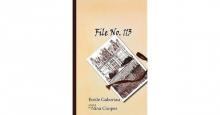 Le dossier no. 113. English
Le dossier no. 113. English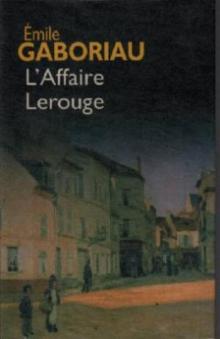 L'affaire Lerouge. English
L'affaire Lerouge. English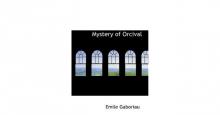 Le crime d'Orcival. English
Le crime d'Orcival. English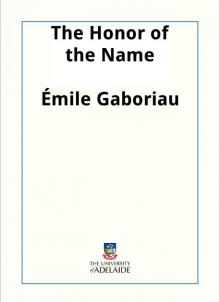 The Honor of the Name
The Honor of the Name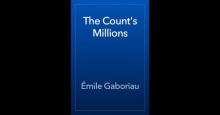 The Count's Millions
The Count's Millions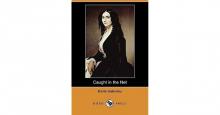 Caught in the Net
Caught in the Net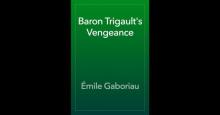 Baron Trigault's Vengeance
Baron Trigault's Vengeance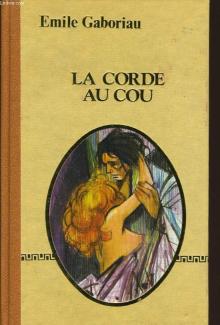 La clique dorée. English
La clique dorée. English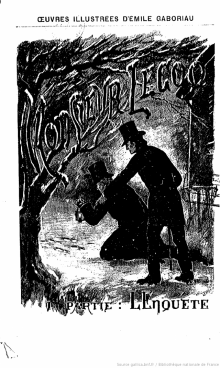 Monsieur Lecoq, v. 1
Monsieur Lecoq, v. 1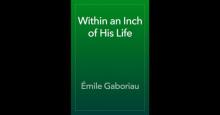 Within an Inch of His Life
Within an Inch of His Life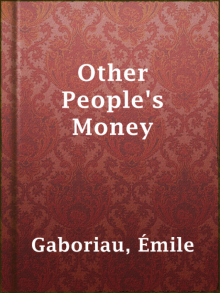 Other People's Money
Other People's Money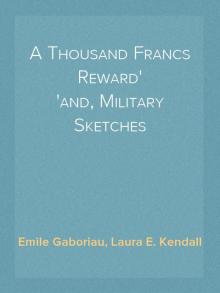 A Thousand Francs Reward; and, Military Sketches
A Thousand Francs Reward; and, Military Sketches